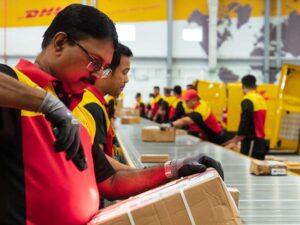The company’s divisions provide a broad portfolio of logistics services to regional customers

The DHL Group has announced plans to invest more than EUR 500mn (US$ 571.34mn) in the Middle East, with a strategic focus on the rapidly expanding Gulf markets of Saudi Arabia (KSA) and the United Arab Emirates (UAE).
This hefty investment, set to take place between 2024 and 2030, underscores DHL’s pledge to the region and its importance for the future of global trade. DHL Group’s Strategy 2030, launched in 2024, prioritizes growth regions and geographic tailwinds generated by shifts in global trade.
The investment spans all four DHL divisions, DHL Express, DHL Global Forwarding, DHL Supply Chain, and DHL eCommerce, and will significantly strengthen the region’s logistics infrastructural landscape.
By enhancing its capabilities and competencies, expanding networks and capacity, and elevating service capabilities, DHL aims to empower businesses operating across and with the Middle East to capitalize on growth opportunities from trade, ensuring support and resilience for customers as they navigate evolving market demands.
Broad portfolio

The company’s divisions provide a broad portfolio of logistics and transportation services to customers in the Middle East, including express parcel delivery, air, ocean and overland freight, warehousing, fulfilment and distribution, customs brokerage and specialized operations for sectors such as life sciences, healthcare, e-commerce and battery logistics.
“The region of the Gulf Cooperation Council (GCC) is rapidly emerging as a global logistics and innovation hub,” affirmed John Pearson, Global CEO, DHL Express. “Our investment reflects the region’s increasing strategic importance in connecting Asia, Europe, and Africa, and our commitment to supporting its transformation into a catalyst for regional and global trade,” he added.
DHL Express is seeing dynamic growth and export potential in the region’s e-commerce sector, for example, which is providing opportunities for entrepreneurs and smaller businesses to expand their offering to global markets,” he continued further.
Supporting FDI
The Middle East is emerging as a vital trade hub, facilitating commerce between Asia, Europe, and the US while serving as a gateway to Africa. The region is witnessing growth not only due to attracting investments from multinationals expanding their operations but also because Gulf- and Middle East-based businesses are growing and increasing their exports.
DHL’s services, the local and global expertise of its team, and the flexibility offered by the company’s extensive transportation and warehousing network and digital platforms, automation and technologies help businesses build supply chain resilience at a time of heightened volatility and uncertainty in global trade, DHL stated in a press communication.

“DHL Supply Chain has actively expanded in Saudi Arabia and UAE in recent years, recognizing the positive economic development, the increasing maturity and sophistication of supply chain operations in the region and the growing demand for specialized, outsourced logistics support,” asserted Hendrik Venter, CEO-DHL Supply Chain, Europe, Middle East & Africa.
“With a strong focus on the energy sector, life sciences, healthcare, and technology, we are poised to take advantage of our contract logistics expertise to meet the unique needs of our customers and drive innovation in these critical areas,” he further noted.
Confidence and commitment
“This investment underscores our confidence in the Middle East’s economic trajectory and our continued commitment to be ahead of the curve in digital capabilities and sustainable transportation for our customers. By expanding our operations, we will be even better positioned to support our clients in navigating the complexities of international trade and logistics,” explained Amadou Diallo, CEO, DHL Global Forwarding, Middle East & Africa,
DHL Group recognizes the growing opportunities in the energy sector, encompassing traditional oil and gas as well as renewables and electrification. The company also sees potential in the life sciences and healthcare markets, alongside the burgeoning e-commerce landscape.
For example, The Kingdom of Saudi Arabia (KSA) is experiencing a strong inbound market for B2C, especially with high-end goods, driven by ongoing tourism initiatives and events.
Targeted investments
The investments will focus on the following areas across DHL’s business units:
DHL Express: Investments will be made in hub and gateway facilities, as well as enhancing aviation capacity to improve service efficiency and delivery speed.
DHL Global Forwarding: The company will expand its overall presence in the region, invest in its fleet – including electric trucks – and pursue joint venture initiatives such as the recent joint venture with Etihad Rail to enhance connectivity and logistics capabilities.

DHL Supply Chain: There will be an expansion of the contract logistics offering in both the UAE and KSA, which includes increasing warehousing capacity, upgrading equipment, and integrating advanced technology to optimize operations.
DHL eCommerce: The acquisition of the delivery provider AJEX in Saudi Arabia will enhance DHL’s e-commerce capabilities, facilitating better last-mile delivery services in a rapidly growing market.
DHL is also committed to sustainability, investing in alternative fuel, and electric delivery vehicles, aviation fuels in air freight and biofuels for road and ocean freight, as well as solar energy and clean power for facilities.
This commitment ensures that supply chains become more sustainable, and customers achieve their net zero ambitions. This is aligned with the agenda of governments in the region to lead on environmental sustainability.
DHL aims to implement best practices in logistics and innovation, strengthening its longstanding position as a leader and investor in the talent and economic potential of the Middle East, the press note concluded.
